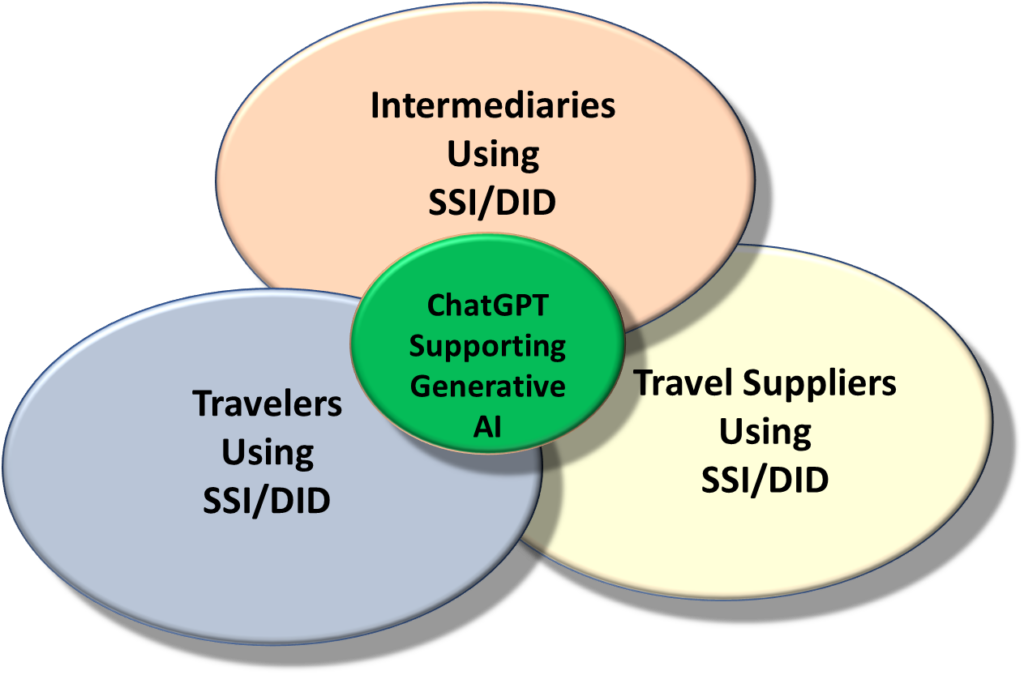ChatGPT Accelerates the Evolution of SSI/DID for Personalized Travel Experiences
An article published by Phocuswright suggested that the evolution DID/SSI, Decentralized Identifiers and Self Sovereign Identity, would transform a fragmented travel experiences market during the next decade. GenAI (Generative AI – Generative Pre-trained Transformers powered by ChatGPT) will accelerate that evolution. The firms, platforms and applications that support those developments have the potential to serve all the aspects of service experience creation and execution from dreaming, planning, reserving, executing, and reviewing travel experiences in a seamless and efficient manner for both individuals and groups, including trip interruption.
Figure 1: Travel Experience Process

For travel, DID/SSI will allow individuals and groups to personalize the travel experience process for individual and integrated group seamless travel experiences from suppliers and intermediaries on a peer-to-peer, real time basis. For consumers applications from suppliers, intermediaries – agents, search engines, shopping sites, tour operators, OTCs and, perhaps, new entrants, will predominately be through mobile devices and involve GenAI to produce voice, visual and textual interactions with intermediaries and suppliers. (See https://www.phocuswire.com/what-will-chatgpt-mean-for-the-travel-industry.) For travel suppliers and intermediaries, SSI/DID will be through connectivity gateways that link to their internal management, information, and consumer interface systems.
Figure 2: GenAI and DID/SSI Ecosystem

For GenAI applications to be adopted, travel experience information (content) must be accurate, verified and timely. Traveler personal information must be managed and protected, individually and collectively. For suppliers and intermediaries, traveler information must also be trusted and accurate.
How the evolution of the GenAI and DID/SSI ecosystem will occur is uncertain; that it will occur is not. The reason: There is economic value created for consumers, suppliers, intermediaries and service providers individually and collectively. By whom and how travel industry value will be captured and/or shared is uncertain.
During the SSI/DID and GenAI evolution, the strategies and tactics of current market players, partnerships among them, and the entrance of new players will determine the winners and losers. Ultimately, consumers and surviving intermediaries and suppliers will all be winners.
Enabling Factors for Evolution
There are three major forces that will make the GenAI and DID/SSI ecosystem an operational market success in delivering more personalized travel experiences:
- Travelers adopt, use and manage their profile information. This means, in part, they trust the content they are presented. It is in form that is efficient, useful and timely. Travelers can protect their own personal interests.
- The technology behind the ecosystem is robust and accessible across industry players and integrated with internal systems that support all aspects of the travel industry experience process. Content is deliverable and accessible via various GenAI applications.
- There are enabling forms of industry cooperation that facilitate efficiently and rapidly the development of the technology ecosystem.
There are already several industry firms focused on this last factor. An early example is Microsoft’s and IBM’s 2018 public commitment to participate in standards development for a set of decentralized identity management technologies across multiple industries.
https://www.microsoft.com/security/blog/2021/10/06/microsofts-5-guiding-principles-for-decentralized-identities/ and https://www.ibm.com/blogs/blockchain/category/trusted-identity/self-sovereign-identity/.
More recent example is Amadeus’s choice of Microsoft to help it implement a technical architecture to support a data strategy and next-generation operating model to better serve personalized and on-demand travel experiences (cite) and Meta swivel to a focus on AI development.
There are also industry groups like TrustOverIP and DID that are committed to encouraging and supporting the development and implementation of a GenAI and DID/SSI architecture in general and the travel industry H&T SIG specifically. A recent example of travel industry coordination around cooperation is H&T SIGs development of a framework for a traveler SSI profile. (cite)
What Should Industry Players Do (or Already Are Doing)?
- Make the evolution of SSI/DID and GenAI a part of internal strategic planning.
- Evaluate options for cooperation, partnerships, acquisitions and arrangements with intermediaries and service providers to optimize future benefits, value creation and market share gains for themselves.
- Understand, support and fund activities that enable the GenAI and SSI/DID evolution in the travel industry:
- Conferences
- Blogs, reports and other media
- Join DIF’s H&T SIG
In summary, travel experience providers and their technology partners should get educated; get involved; and be more public.
About the author
Bill Carroll is actively engaged with hotel ownership groups, intermediaries and start ups in the areas of digital media management, pricing, and marketing. He is capable of taking a holistic view of marketing, pricing, distribution and revenue management for hospitality related firms. He helps clients chart a successful courses of action through improved strategic focus, organizational change and systems solutions choices. Bill is a Consulting Member of Cayuga Hospitality Consultants and a senior analyst with Phocuswright.
Contact Us




